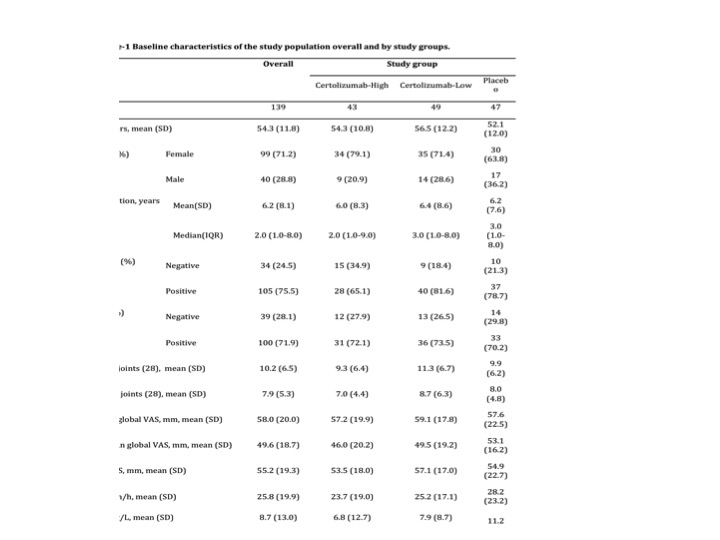Session Information
Date: Monday, November 9, 2020
Title: RA – Diagnosis, Manifestations, & Outcomes Poster IV: Lifespan of a Disease
Session Type: Poster Session D
Session Time: 9:00AM-11:00AM
Background/Purpose: Personalization of RA treatment is not optimal due to lack of predictors. We previously demonstrated in RA patients that central nervous system (CNS) pain response to tender joint compression, measured by using functional MRI (fMRI) of the brain rapidly wanes after 24 hours of anti-TNF administration and that a higher pre-treatment BOLD signal volume seems to predict clinical response to treatment with certolizumab-pegol (CZP)1,2. We therefore hypothesized that the CNS pain response upon compression of a painful joint could predict subsequent anti-TNF treatment response.
Methods: Adult RA patients fulfilling the 2010 ACR/EULAR classification criteria with a DAS28 >3.2 under stable DMARD treatment for at least 3 months were eligible. Patients underwent fMRI scanning of the brain at screening for stratification by CNS pain response. Whole brain BOLD-signal-voxel-count of 700 units classifying between low and high, and were randomized to CZP or placebo (2:1) The primary outcome was low disease activity (LDA, DAS28 ≤3.2) after 12 weeks of treatment.
Results: 156 RA patients, inadequate responders to csDMARD, signed the informed consent. 139 patients (46/47, 46/49 and 42/43) (99 females, 71%) with moderate-high disease activity (mean (SD) DAS-28: 4.83 (1.03)) could be included respectively and completed the 12-week study treatment. Geometric mean (SD) numbers of baseline BOLD signal positive voxels were 559 (10), 81 (12) and 2498 (3) in the 3 arms respectively. The mean DAS28 (SD) scores after 12 weeks of study treatment were Placebo: 3.89 (1.29), CZP-L: 3.42 (1.06) and CZP-H: 3.06 (1.04). LDA was achieved in 12/47 patients (25.5 %) in placebo, 22/49 (44.9%) in the CZP-L, and 25/43, (58.1%) in the CZP-H arm. The linear effect term for the ordinal study group variable supported a linear trend of increasing CZP treatment effect with increasing baseline CNS pain response. RR (95% CI) for achieving LDA with each unit increase in treatment category over placebo was 1.79 (1.24 to 2.74, p=0.003).
Conclusion: A higher pre-treatment brain activity in response to pain measured with fMRI predicts the chance of achieving low disease activity with CZP treatment.
To cite this abstract in AMA style:
Rech J, Schenker H, Tascilar K, Hagen M, Kleyer A, Simon D, Valor Mendez L, Schoenau V, Prade J, Sergeeva M, Sulvakumar M, Strobelt S, Konerth L, Behrens F, Baerwald C, Finzel S, Voll R, Hueber A, Roesch J, Feist E, da Silva J, Doerfler A, Damjanov N, Hess A, Schett G. Brain fMRI Predicts Responses to Certolizumab Pegol in RA. an International, Multi-center, Randomized, Double-blind, Placebo-controlled Trial (PreCePRA) [abstract]. Arthritis Rheumatol. 2020; 72 (suppl 10). https://acrabstracts.org/abstract/brain-fmri-predicts-responses-to-certolizumab-pegol-in-ra-an-international-multi-center-randomized-double-blind-placebo-controlled-trial-precepra/. Accessed .« Back to ACR Convergence 2020
ACR Meeting Abstracts - https://acrabstracts.org/abstract/brain-fmri-predicts-responses-to-certolizumab-pegol-in-ra-an-international-multi-center-randomized-double-blind-placebo-controlled-trial-precepra/

